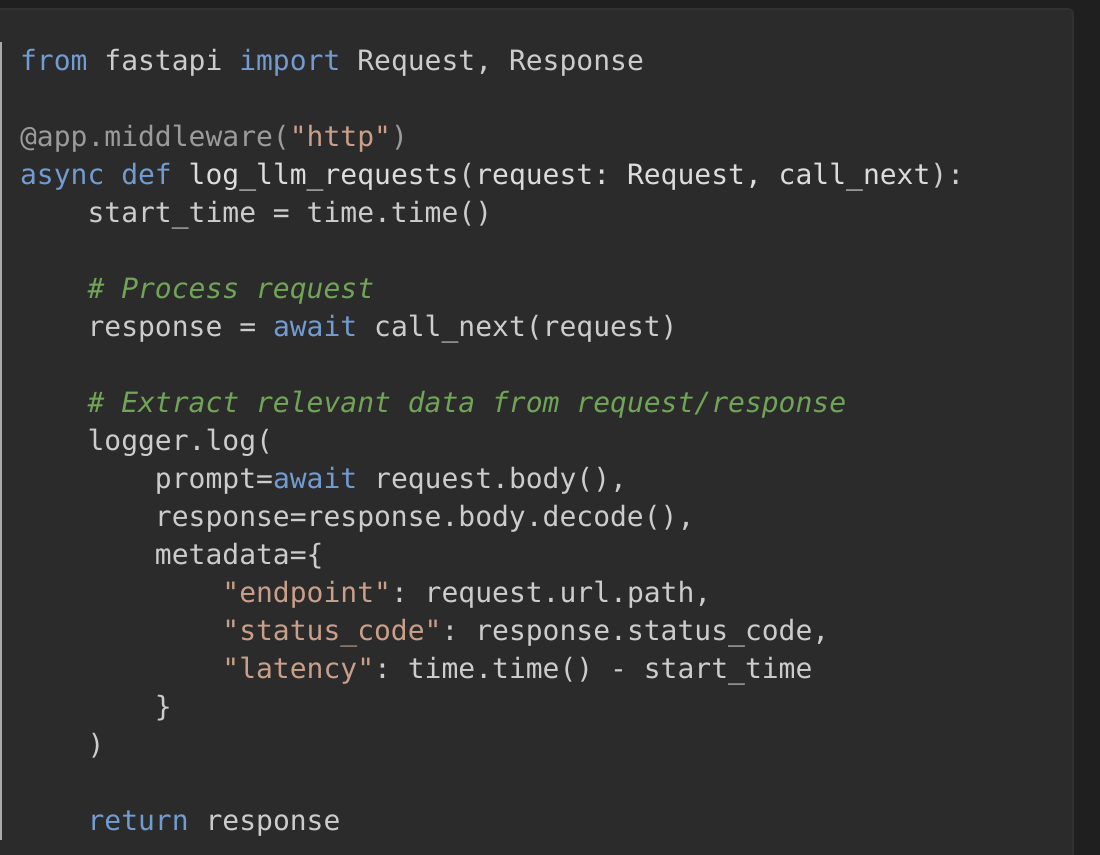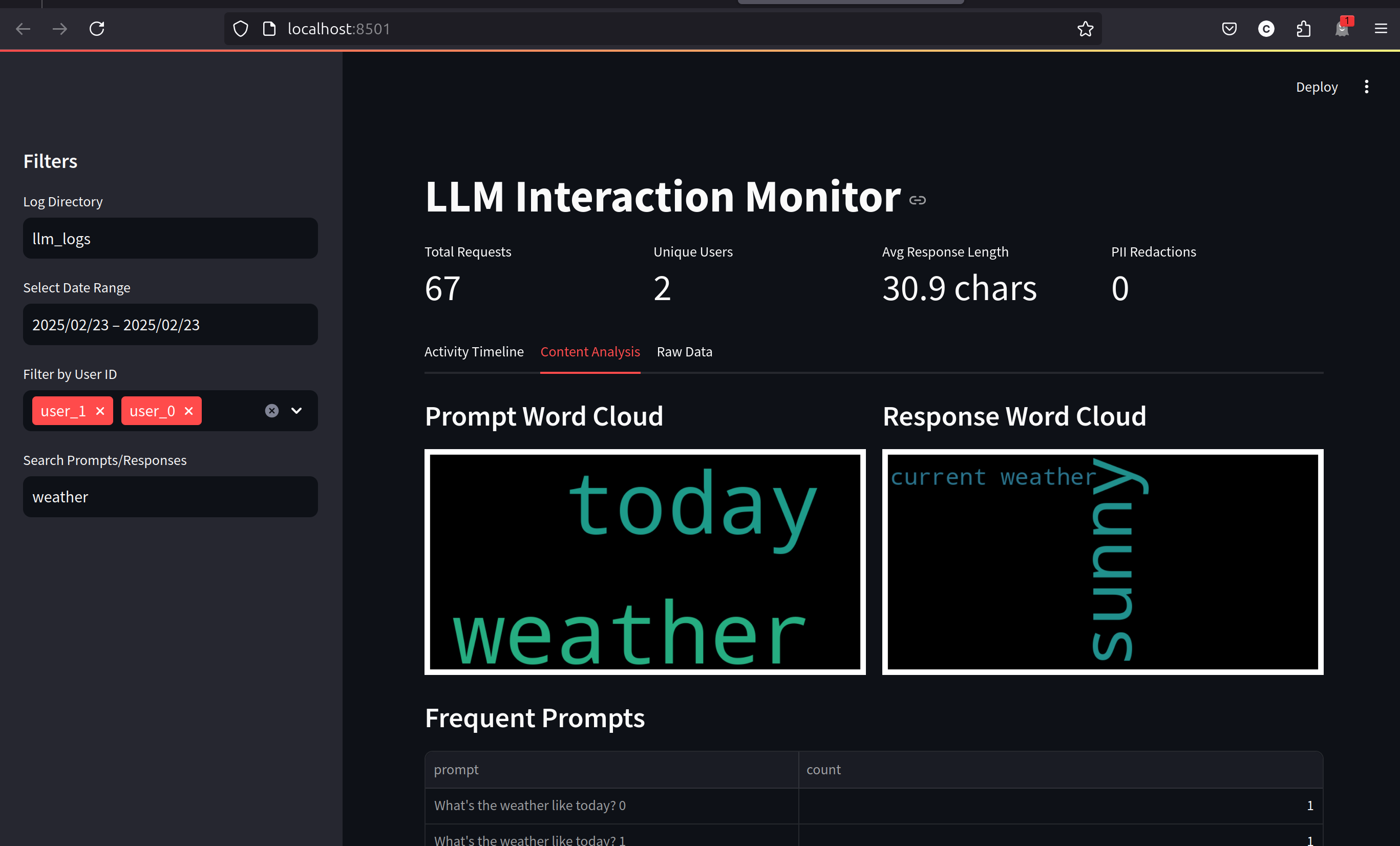
Posted by Jesse JCharis
Feb. 23, 2025, 5:49 a.m.
The Critical Importance of Logging LLM Prompts and Responses
Why Logging LLM Interactions Matters
As Large Language Models (LLMs) become integral to business applications, systematic logging of prompts and responses emerges as a critical requirement. Here's why:
Transparency & Auditability
- Trace decision-making processes
- Meet GDPR/CPRA compliance requirements
- Investigate inappropriate outputs
Model Improvement
- Identify edge cases through real-world usage patterns
- Detect prompt injection attacks
- Analyze common failure modes
Performance Monitoring
- Track latency/quality metrics
- Calculate API costs
- Monitor output consistency
Legal Protection
- Maintain records of AI-generated content
- Demonstrate due diligence
- Support copyright disputes
Monitoring Tools Landscape
1. Specialized LLM Observability Platforms
- Arize AI: Tracks model drift and data quality
- WhyLabs: Monitors statistical distributions of prompts/responses
- LangSmith: Specialized for LangChain workflows
2. General-Purpose MLOps Tools
# MLflow Tracking Example
import mlflow
with mlflow.start_run():
mlflow.log_param("prompt", user_input)
mlflow.log_metric("response_length", len(output))
mlflow.log_text(output, "response.txt")
# MLflow Tracking Example
import mlflow
with mlflow.start_run():
mlflow.log_param("prompt", user_input)
mlflow.log_metric("response_length", len(output))
mlflow.log_text(output, "response.txt")
3. Custom Solutions (Recommended for Sensitive Data)
# Elasticsearch + Kibana Stack
from elasticsearch import Elasticsearch
es = Elasticsearch()
doc = {
"prompt": sanitized_input,
"response": output,
"timestamp": datetime.now().isoformat(),
"model_version": "gpt-4-0613"
}
es.index(index="llm_logs", document=doc)
# Elasticsearch + Kibana Stack
from elasticsearch import Elasticsearch
es = Elasticsearch()
doc = {
"prompt": sanitized_input,
"response": output,
"timestamp": datetime.now().isoformat(),
"model_version": "gpt-4-0613"
}
es.index(index="llm_logs", document=doc)
Robust Python Implementation
Feature Requirements
- Secure storage with access controls
- Metadata capture (timestamps, model versions)
- PII redaction capabilities
- Asynchronous logging to prevent latency spikes
- Rotation/archiving strategies
Complete Logging Class
import json
import datetime
from functools import wraps
import hashlib
import os
from typing import Optional, Dict, Any
class LLMLogger:
def __init__(
self,
log_dir: str = "llm_logs",
max_file_size: int = 1000000, # 1MB per file
redact_keys: list = ["ssn", "credit_card"]
):
os.makedirs(log_dir, exist_ok=True)
self.log_dir = log_dir
self.max_file_size = max_file_size
self.redact_keys = redact_keys
# Initialize current log file
self.current_file = self._get_current_filename()
def _redact_data(self, data: str) -> str:
"""Basic PII redaction"""
for key in self.redact_keys:
data = data.replace(key, "[REDACTED]")
return data
def _get_current_filename(self) -> str:
return os.path.join(
self.log_dir,
f"llm_log_{datetime.datetime.now().strftime('%Y%m%d_%H%M')}.ndjson"
)
def _rotate_file(self):
if os.path.getsize(self.current_file) > self.max_file_size:
self.current_file = self._get_current_filename()
def log(
self,
prompt: str,
response: str,
metadata: Optional[Dict[str, Any]] = None,
user_id: Optional[str] = None
) -> str:
"""Core logging method"""
log_entry = {
"timestamp": datetime.datetime.now().isoformat(),
"prompt_hash": hashlib.sha256(prompt.encode()).hexdigest(),
"prompt": self._redact_data(prompt),
"response": response,
"metadata": metadata or {},
"user_id": user_id or "anonymous"
}
try:
with open(self.current_file, "a") as f:
f.write(json.dumps(log_entry) + "\n")
self._rotate_file()
return log_entry["prompt_hash"]
except Exception as e:
# Fallback logging
print(f"Logging failed: {str(e)}")
return ""
@staticmethod
def log_async(func):
"""Decorator for asynchronous logging"""
@wraps(func)
async def wrapper(*args, **kwargs):
start_time = datetime.datetime.now()
result = await func(*args, **kwargs)
# Assuming function returns tuple (prompt, response)
prompt, response = result
logger = LLMLogger()
logger.log(
prompt=prompt,
response=response,
metadata={
"latency_ms": (datetime.datetime.now() - start_time).total_seconds() * 1000,
"function": func.__name__
}
)
return result
return wrapper
# Usage Example (Synchronous)
logger = LLMLogger(redact_keys=["password"])
logger.log(
prompt="What's our internal API key format?",
response="I cannot disclose that information.",
metadata={"model_version": "gpt-4-0125"},
user_id="user_123"
)
# Usage Example (Async Decorator)
@LLMLogger.log_async
async def generate_response(prompt: str) -> tuple:
# Simulate LLM call
response = await llm_api(prompt)
return prompt, response
import json
import datetime
from functools import wraps
import hashlib
import os
from typing import Optional, Dict, Any
class LLMLogger:
def __init__(
self,
log_dir: str = "llm_logs",
max_file_size: int = 1000000, # 1MB per file
redact_keys: list = ["ssn", "credit_card"]
):
os.makedirs(log_dir, exist_ok=True)
self.log_dir = log_dir
self.max_file_size = max_file_size
self.redact_keys = redact_keys
# Initialize current log file
self.current_file = self._get_current_filename()
def _redact_data(self, data: str) -> str:
"""Basic PII redaction"""
for key in self.redact_keys:
data = data.replace(key, "[REDACTED]")
return data
def _get_current_filename(self) -> str:
return os.path.join(
self.log_dir,
f"llm_log_{datetime.datetime.now().strftime('%Y%m%d_%H%M')}.ndjson"
)
def _rotate_file(self):
if os.path.getsize(self.current_file) > self.max_file_size:
self.current_file = self._get_current_filename()
def log(
self,
prompt: str,
response: str,
metadata: Optional[Dict[str, Any]] = None,
user_id: Optional[str] = None
) -> str:
"""Core logging method"""
log_entry = {
"timestamp": datetime.datetime.now().isoformat(),
"prompt_hash": hashlib.sha256(prompt.encode()).hexdigest(),
"prompt": self._redact_data(prompt),
"response": response,
"metadata": metadata or {},
"user_id": user_id or "anonymous"
}
try:
with open(self.current_file, "a") as f:
f.write(json.dumps(log_entry) + "\n")
self._rotate_file()
return log_entry["prompt_hash"]
except Exception as e:
# Fallback logging
print(f"Logging failed: {str(e)}")
return ""
@staticmethod
def log_async(func):
"""Decorator for asynchronous logging"""
@wraps(func)
async def wrapper(*args, **kwargs):
start_time = datetime.datetime.now()
result = await func(*args, **kwargs)
# Assuming function returns tuple (prompt, response)
prompt, response = result
logger = LLMLogger()
logger.log(
prompt=prompt,
response=response,
metadata={
"latency_ms": (datetime.datetime.now() - start_time).total_seconds() * 1000,
"function": func.__name__
}
)
return result
return wrapper
# Usage Example (Synchronous)
logger = LLMLogger(redact_keys=["password"])
logger.log(
prompt="What's our internal API key format?",
response="I cannot disclose that information.",
metadata={"model_version": "gpt-4-0125"},
user_id="user_123"
)
# Usage Example (Async Decorator)
@LLMLogger.log_async
async def generate_response(prompt: str) -> tuple:
# Simulate LLM call
response = await llm_api(prompt)
return prompt, response
Advanced Features in Action
- FastAPI Middleware Integration

from fastapi import Request, Response
@app.middleware("http")
async def log_llm_requests(request: Request, call_next):
start_time = time.time()
# Process request
response = await call_next(request)
# Extract relevant data from request/response
logger.log(
prompt=await request.body(),
response=response.body.decode(),
metadata={
"endpoint": request.url.path,
"status_code": response.status_code,
"latency": time.time() - start_time
}
)
return response- Automated Alerting
class MonitoringService:
def __init__(self):
self.logger = LLMLogger()
def check_response_quality(self):
recent_logs = self.load_last_hour_logs()
# Detect potential hallucinations
uncertain_responses = [
log for log in recent_logs
if any(phrase in log["response"].lower()
for phrase in ["i'm not sure", "as an ai"])
]
if len(uncertain_responses) > 10:
alert_team(f"High uncertainty rate: {len(uncertain_responses)}/hour")

from fastapi import Request, Response
@app.middleware("http")
async def log_llm_requests(request: Request, call_next):
start_time = time.time()
# Process request
response = await call_next(request)
# Extract relevant data from request/response
logger.log(
prompt=await request.body(),
response=response.body.decode(),
metadata={
"endpoint": request.url.path,
"status_code": response.status_code,
"latency": time.time() - start_time
}
)
return responseclass MonitoringService:
def __init__(self):
self.logger = LLMLogger()
def check_response_quality(self):
recent_logs = self.load_last_hour_logs()
# Detect potential hallucinations
uncertain_responses = [
log for log in recent_logs
if any(phrase in log["response"].lower()
for phrase in ["i'm not sure", "as an ai"])
]
if len(uncertain_responses) > 10:
alert_team(f"High uncertainty rate: {len(uncertain_responses)}/hour")
Best Practices
- Data Anonymization
from presidio_analyzer import AnalyzerEngine
analyzer = AnalyzerEngine()
def advanced_redaction(text: str) -> str:
results = analyzer.analyze(text=text, language="en")
for result in results:
text = text.replace(text[result.start:result.end], "[REDACTED]")
return text
- Secure Storage
- Encrypt logs at rest (AWS KMS/GCP Cloud KMS)
- Implement role-based access control (RBAC)
- Use immutable storage buckets for audit logs
- Retention Policies
def apply_retention_policy(log_dir: str = "llm_logs", days=30):
cutoff = time.time() - days * 86400
for f in os.listdir(log_dir):
path = os.path.join(log_dir,f)
if os.stat(path).st_mtime 1% of responses | Real-time + Daily |
| Average response length | ±20% from baseline | Hourly |
| PII leakage | Any occurrence | Real-time |
| API latency | >5s p95 | 5-minute rolling |
from presidio_analyzer import AnalyzerEngine
analyzer = AnalyzerEngine()
def advanced_redaction(text: str) -> str:
results = analyzer.analyze(text=text, language="en")
for result in results:
text = text.replace(text[result.start:result.end], "[REDACTED]")
return text
def apply_retention_policy(log_dir: str = "llm_logs", days=30):
cutoff = time.time() - days * 86400
for f in os.listdir(log_dir):
path = os.path.join(log_dir,f)
if os.stat(path).st_mtime 1% of responses | Real-time + Daily |
| Average response length | ±20% from baseline | Hourly |
| PII leakage | Any occurrence | Real-time |
| API latency | >5s p95 | 5-minute rolling |
Conclusion
Effective LLM logging requires both technical implementation and organizational policies:
Technical Implementation
- Use the provided
LLMLoggerclass as foundation - Add environment-specific security controls
- Integrate with existing monitoring stacks
- Use the provided
Organizational Policies
- Define retention periods (30-90 days recommended)
- Establish access approval workflows
- Conduct regular log audits
For enterprise deployments consider combining custom logging with commercial tools like DataDog's AI Monitoring or Splunk's AI Observability suite.
Final Recommendation: Start with the custom Python implementation above for full control over sensitive data handling while evaluating commercial solutions for advanced analytics needs.
We can also visualize our logs in streamlit as below

Happy Coding
Jesus Saves
No tags associated with this blog post.
Recent Posts
NLP Analysis
- Sentiment: negative
- Subjectivity: negative
- Emotions: joy
- Probability: {'anger': 7.70042910780245e-179, 'disgust': 8.413050749631919e-216, 'fear': 1.3026307644249056e-199, 'joy': 1.0, 'neutral': 0.0, 'sadness': 5.685829427562536e-207, 'shame': 1.557545565521416e-297, 'surprise': 9.800832040830775e-241}